
I arrive just before midnight on a windswept Yorkshire evening (let's face it, aren't they all?) to meet Fred Tidball, 63, and Dan Copperwheat, 21, Night Support Workers at St George’s Crypt in Leeds.
The crypt was converted in 1930 by the Reverend Don Collins to provide solace to those feeling the hardships of the Depression and now operates at what Dan calls “the frontline of homelessness in Leeds", the only place prepared to take the “street homeless” (those with no bed for the night and no referral). Service-users frequently include those suffering from alcoholism, drug and gambling addictions, mental illness or domestic violence.
I am met at the door by Dan, a Sports Science student at Leeds Met University, who ushers me into a small reception area with small brown leather armchairs and a white tiled floor. First impressions are good. If this was a hotel, I’d happily stay in it, the result of an elegant refit unveiled in February this year. I hear Fred before I see him, a booming disembodied voice echoing through the corridors. A former alcoholic himself, who lived homeless for several years, he has worked at the Crypt since 2006 and greets me with a knuckle-crunching handshake.
The revamp (covered by the Guardianlocal here) was more than cosmetic though, and the hostel now offers more than just a meal and a bed for the night. Team leaders work throughout the week to find clients new, more permanent accommodation. As Dan poetically puts it: “Now it’s not just a plaster on a gunshot wound.” Nevertheless, the crypt only has fifteen rooms, so they inevitably have to turn people away, a fact sorely acknowledged by Dan, who tells me: "I’d love to be able to take everyone, but we just physically can’t.”
It’s a peaceful night tonight, a few groups of young men pass through, but that isn’t always so. Dan calls it “a challenging job, perhaps the most challenging”. Fred tells me that in the four years he has been at the Crypt, he has been threatened with knifes, broken bottles, one man told him he’d set him on fire, and one even pulled a gun. “I told him if he didn’t put it away, he’d be leaving the Crypt with metal fillings,” he tells me with a mischievous smile.
Nevertheless, the pair’s enthusiasm for the job appears undimmed. Both practising Christians (though Fred is keen to stress that he isn’t the “bash-people-over-the-head-with-a-Bible-kind”), the pair stress that the positives far outweigh the negatives and both talk of the job in terms of a religious vocation. "You wouldn't do this job if you didn't have some sort of calling," is how Fred puts it to me.
Asked of the frustrations of their jobs, they cite the fact that they often don’t get to hear about the success stories (interestingly, a paramedic friend told me a similar thing recently). Dan is pragmatic about this though: “people are not here to rebuild their lives, we’re here to bridge the gap between homelessness and sustainable, ‘positive’ accommodation.” Fred qualifies this slightly: "we're not here to rebuilt their lives, but we are here to encourage them to take the next step."
There are good news stories though, and it's those that make it worthwhile. Fred regales me with a story about a former resident at the crypt who he helped get off the drink. "He paid me the greatest compliment I've ever had," Fred tells me. "He said, "You're the most devious bastard I've ever met." But he meant it in a good way!"
As I wind the interview up, Fred approvingly quoting Muhammad Ali line "Even if I emptied garbage cans, I'd aspire to be the best garbage collector there was." It seems a perfect encapsulation of the commitment and passion they demonstrate for their job. As he says as he shows me out, back into the alcohol-fuelled chaos of a Saturday night in central Leeds: “At the end of the day, we’re all here for the folks that come through that door”.
For more information on the work done at St George's Crypt, and the work that they do, see: http://www.stgeorgescrypt.org.uk/

